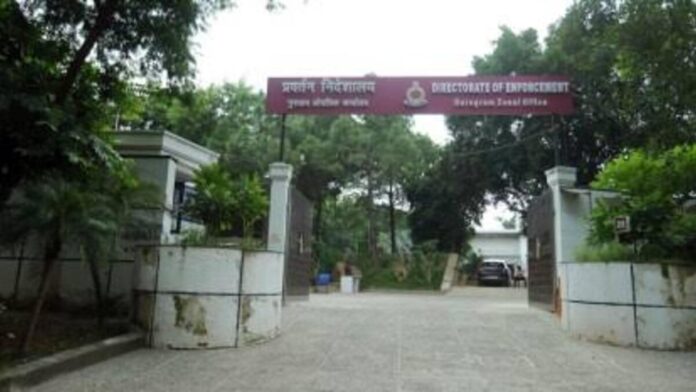A large “ED” with a rapidly fading letter “D” is painted on the farmhouse’s façade. There’s an interrogation centre and a dual lock-up/waste yard for abandoned sarkari furniture within the empty indoor swimming pool. Staff members feed a stray family with a litter of puppies near the “canteen,” a former opulent dining room, and allow them free reign of the 2.5-acre property.
Farm No. 22, located in the Greens, Rajokri, south Delhi, has been the Enforcement Directorate’s (ED) Gurugram Zonal office for the past two years. The bank that the property was mortgaged to is contesting the ED’s attempt to seize it.
A visit reveals that there are approximately 100 people working there, not counting temporary workers. Seized cars sit on the farmhouse’s expansive central lawn, which is bordered by silver palm and fir trees and has a market value estimated by local real estate dealers at Rs 120 crore. On Thursday, there were roughly forty vehicles, some of which cost more than Rs 1 crore.
Officers claim that expensive cars seized as proceeds of crime are lined up at this expansive ED “office” in Rajokri when ED headquarters in New Delhi runs out of room to keep them. One spacious living room serves as both the agency’s training centre and a yard for seized cars, according to the ED.
This exact farmhouse has been the focus of a great deal of litigation, first before the Delhi High Court, the Debt Recovery Tribunal (DRT), and now the Prevention of Money Laundering Act (PMLA) court in Panchkula. In this case, the Union Bank of India (formerly Corporation Bank) is contesting the ED’s attachment and confiscation of the property, arguing that it is a “proceed of crime.”
The farmhouse belonged to broker Atul Bansal, who passed away after being named as the primary offender in a case involving property and money laundering.
He had bought the house in 2004. In 2012, he mortgaged it to a group of banks for a total of Rs 111 crore, along with other properties.
Atul Bansal’s company Wisdom Realtors mortgaged the Rajokri farmhouse to Union Bank of India. The bank gained ownership of the property in 2017 following a default.
It was Wisdom Realtors which challenged the possession in the DRT and secured a stay order, which the bank again appealed against in Debt Recovery Appellate Tribunal (DRAT).
At that point, Wisdom Realtors had submitted a “settlement proposal to the Bank for Rs 96 crores odd for which amount there was a buyer ready to buy the property,” according to a reading of the 2019 DRAT order, but the sale ultimately fell through.
Lawyers appearing for the Union Bank in Panchkula said that it was in 2019, again, that they learnt that it was the ED that had first attached and later confiscated the property which had been mortgaged with them.
That order of confiscation and its confirmation, too, has been challenged by the Bank.
When contacted, Union Bank of India’s lawyer Alok Kumar explained why the ED’s confiscation and subsequent usage of the Rajokri property was being challenged by the Bank. “The purpose of attachment or confiscation (by ED) is to realize the dues for the Government exchequer. If the purpose is defeated by the fact that despite attachment or confiscation, the ED has neither handed over the property to the Bank nor auctioned it to realize public money, at the end of the day, the property has become NPA (Non Performing Asset). By opening an office inside, that very purpose of PMLA is defeated.”
According to top officials of ED in New Delhi, the Rajokri property was among three such confiscated properties in which the investigating agency was running “establishments.”
The other two were in Ranchi and Mumbai where there may be no challenge from Banks as in the case of the Rajokri property.
The officials said that under provisions of Section 9 of the PMLA, such “confiscated properties” remain “vested with the Central Government” and that it was a Gazette notification of the Ministry of Finance dated September 12, 2023 that gave powers to Special Directors of the ED to act as “Administrators” to “receive, manage and dispose the property confiscated…”
Said a top official: “While the notification does not state that the ED can use the confiscated properties as offices, the properties can be used and managed as the Department wants. We are, simply, using this farmhouse, for example, till the time of disposal of the property comes.”
Inside the Rajokri farmhouse, officers and staff have occupied the once private bedrooms, living rooms and walk-in closets as converted office spaces. They said “maintenance” of the place is a daunting task. Said a senior official working in farmhouse: “Ideally, the ED should have its Gurugram zonal office in Gurugram itself and if we do get alternative space, maybe the farmhouse will be used by the ED as a training centre in future. By using the property as its zonal office, at least the farmhouse is being maintained and not being allowed to go into disrepair.”




